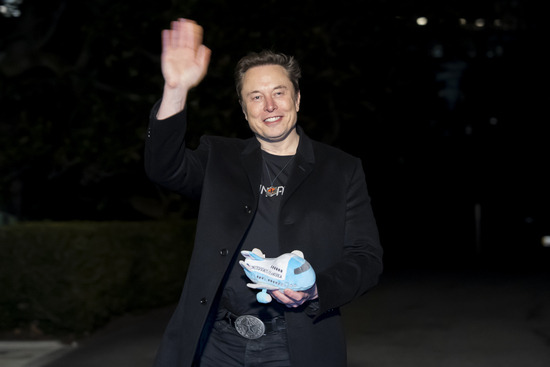Trump may try to buy off Americans with DOGE refund scam
President Donald Trump said Wednesday that he’s considering sending money directly to Americans, using funds from the claimed savings of Elon Musk’s so-called Department of Government Efficiency.
“We’re thinking about giving 20% back to the American citizens and 20% down to pay back debt,” Trump said at a conference of business executives in Florida. “If it were a real-estate balance sheet, the debt is tiny, but we still, we still want to pay it down.”
Even if DOGE’s recovered savings could be split among the American people and the federal deficit—with 20% going toward each—it’s unclear what the president’s plans are for the leftover 60%.
And that’s not even the biggest issue immediately facing this alleged plan.
For starters, despite persistent vows for transparency, it’s unclear how much money DOGE has actually eliminated—or will claim to save despite evidence to the contrary. After all, the advisory committee’s website has published misleading information about the amount of money it claimed to have recouped, including an erroneous $8 billion figure. (The figure was actually $8 million.)
And if Trump were to proceed with this, that would suggest he’s taking policy advice from Musk, who holds no direct governmental power and is sourcing ideas from strangers on X, the social media platform he owns. Earlier this week, James Fishback, CEO of the investment firm Azoria, suggested on X that the federal government issue tax refund checks based on supposed savings identified by DOGE.
Musk seemed enthusiastic about the idea, replying that he would “check” with Trump about it—and apparently, he did.
If Trump is indeed getting ideas for governing from Musk, it raises the question of who is truly running the U.S. government. While the answer ought to be Trump (unfortunately), Musk has steamrolled Washington, D.C., in an effort to reshape the federal government—and he appears to have the president’s approval. Agencies that have already faced Musk’s wrath include the Department of Education, the National Institutes of Health, and the United States Agency for International Development. And Trump has allowed Musk to do it, with little pushback.
It makes sense Trump would want to send checks to Americans. He may not genuinely care about the average person, but he certainly savored seeing his name on stimulus checks issued during the COVID-19 pandemic. The potential recipients of the checks probably like the idea, too. Even people who despise the federal government know its checks will clear.
While it’s a politically seductive idea, there are several issues with it.
First off, Fishback’s plan (per his post on X) is based on the assumption that DOGE can eliminate $2 trillion of supposed federal waste—something Musk himself said isn’t possible. In fact, that number has since been halved, according to Musk.

“Well, the overall goal is to try to get $1 trillion out of the deficit,” Musk said Tuesday night during a Fox News interview that Trump also attended. “If the deficit is not brought under control, America will go bankrupt. This is a very important thing for people to understand.”
Additionally, DOGE’s so-called savings aren’t really cash we’re getting back. As various federal budget experts told NOTUS, it’s unlikely that the federal government will be able to unilaterally direct congressionally appropriated funds away from agencies, meaning those dollars saved won’t make their way into taxpayers’ pockets or be used to pay down the national debt.
Furthermore, Fishback’s proposal acknowledged that households would receive checks only if they are “net payers of federal income tax,” which would seemingly exempt millions of (largely low- or no-income) people.
Then there’s the complication that a direct stimulus payment to Americans would require congressional approval, and even some Republicans are skeptical of the idea.
Republican Rep. Josh Hawley of Missouri told Business Insider that he’d prefer any DOGE-related savings to go toward the child tax credit. Democrats, including Sen. Chris Murphy of Connecticut, have dismissed the idea, calling it a “con.”
Regardless, it’s alarming that the president is considering ideas from two unelected individuals whose understanding of government data has been mediocre at best. In any case, the idea still has a long way to go, so don’t expect a DOGE check with Musk and Trump’s signatures anytime soon.
